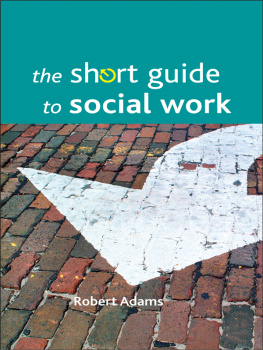John Hudson - The Short Guide to Social Policy
Here you can read online John Hudson - The Short Guide to Social Policy full text of the book (entire story) in english for free. Download pdf and epub, get meaning, cover and reviews about this ebook. year: 2008, publisher: Policy Press, genre: Politics. Description of the work, (preface) as well as reviews are available. Best literature library LitArk.com created for fans of good reading and offers a wide selection of genres:
Romance novel
Science fiction
Adventure
Detective
Science
History
Home and family
Prose
Art
Politics
Computer
Non-fiction
Religion
Business
Children
Humor
Choose a favorite category and find really read worthwhile books. Enjoy immersion in the world of imagination, feel the emotions of the characters or learn something new for yourself, make an fascinating discovery.
- Book:The Short Guide to Social Policy
- Author:
- Publisher:Policy Press
- Genre:
- Year:2008
- Rating:5 / 5
- Favourites:Add to favourites
- Your mark:
- 100
- 1
- 2
- 3
- 4
- 5
The Short Guide to Social Policy: summary, description and annotation
We offer to read an annotation, description, summary or preface (depends on what the author of the book "The Short Guide to Social Policy" wrote himself). If you haven't found the necessary information about the book — write in the comments, we will try to find it.
The Short Guide to Social Policy — read online for free the complete book (whole text) full work
Below is the text of the book, divided by pages. System saving the place of the last page read, allows you to conveniently read the book "The Short Guide to Social Policy" online for free, without having to search again every time where you left off. Put a bookmark, and you can go to the page where you finished reading at any time.
Font size:
Interval:
Bookmark:

Second edition published in Great Britain in 2015 by
University of Bristol
1-9 Old Park Hill
Bristol BS2 8BB
UK
+44 (0)117 954 5940
www.policypress.co.uk
Policy Press
c/o The University of Chicago Press
1427 East 60th Street
Chicago, IL 60637, USA
t: +1 773 702 7700
f: +1 773-702-9756
www.press.uchicago.edu
A catalogue record for this book is available from the British Library.
A catalog record for this book has been requested.
ISBN 978-1-4473-2569-7 ePub
ISBN 978-1-4473-2570-3 Mobi
Front cover image kindly supplied by www.alamy.com
Readers Guide
This book has been optimised for PDA.
Tables may have been presented to accommodate this devices limitations.
Image presentation is limited by this devices limitations.
the euro (European currency) | |
ALMP | active labour market policy |
AUS$ | Australian dollars (currency of Australia) |
DKK | Danish kroner (currency of Denmark) |
EU | European Union |
EUROSTAT | The statistical office of the European communities |
GDP | gross domestic product (a measure of economic output that represents the total size of a nations economy) |
ICVS | International Crime Victims Survey |
ILO | International Labour Organisation |
IMF | International Monetary Fund |
NZ$ | New Zealand dollars (currency of New Zealand) |
OECD | Organisation for Economic Co-operation and Development |
PISA | Programme for International Student Assessment |
QUANGO | quasi-autonomous non-governmental organisation |
SEK | Swedish krona (currency of Sweden) |
TANF | Temporary Assistance for Needy Families |
UN | United Nations |
UNDP | United Nations Development Programme |
UNESCO | United Nations Educational, Scientific and Cultural Organization |
UNODC | United Nations Office on Drugs and Crime |
UNICEF | United Nations Childrens Fund |
UNICRI | United Nations Interregional Crime and Justice Research Institute |
US$ | US dollars (currency of the US) |
WHO | World Health Organization |

Font size:
Interval:
Bookmark:
Similar books «The Short Guide to Social Policy»
Look at similar books to The Short Guide to Social Policy. We have selected literature similar in name and meaning in the hope of providing readers with more options to find new, interesting, not yet read works.
Discussion, reviews of the book The Short Guide to Social Policy and just readers' own opinions. Leave your comments, write what you think about the work, its meaning or the main characters. Specify what exactly you liked and what you didn't like, and why you think so.














